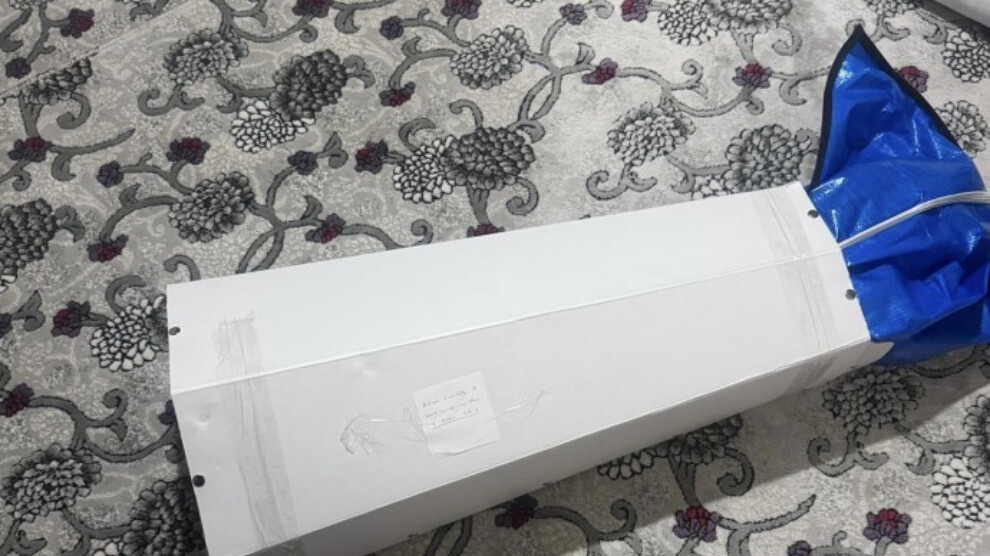The Turkish state continues employing inhumane methods against the Kurdish guerrillas, even after their death.

Menfiyat Elçiçek (Axin Seydo), a guerrilla fighter in the ranks of YJA Star (Free Women’s Troops) lost her life in a clash with Turkish troops in the countryside of Şırnak province in northern Kurdistan on 14 September 2018.
Called by Hakkari Security Directorate and informed about the death of their daughter, the Elçiçek family went to Hakkari and gave DNA samples. The body of the YJA Star was then reported buried in Hakkari without notice to her family.
On 29 November 2023, Hakkari Security Directorate called the Elçiçek family again and told them that the body was at the Forensic Medicine Institute in Istanbul. The family then went to Istanbul where they were handed over the remains of their daughter in a white cardboard box.
The family brought the body to the İdil district of Şırnak and buried it at the Şêx Hesen Cemetery under police siege.
This is not the first time a family has received the dead body of their family members in a storage box. The Turkish state systematically uses the bodies of guerrillas in its war against the Kurdish people. Hundreds of guerrilla graves have been destroyed in recent years. Sending the remains of fallen guerrillas is intended to increase the impact of state brutality and maximise the pain and anger of families and Kurdish society. The aim is to create a collective feeling of helplessness. The aim is to traumatise relatives in an extreme way and thus force them to surrender by breaking their will to resist and their fighting morale.
Hakan Arslan died in 2016 during the siege of the old district of Sur in Amed (tr. Diyarbakir). Friends buried him next to a church, where his bones were found in 2021. Despite DNA matching, it took almost another year for the state to release the body. The Diyarbakır Chief Prosecutor’s Office handed Ali Rıza Arslan his son’s mortal remains in a bag on 29 August 2022. That same evening, the burial could finally take place in a cemetery in his home village in Erzurum province.
The body of Zindan Yedi who died in a clash in the Dicle district of Amed (Diyarbakır) in September 2021 was given to his father, Hasan Yeni, in a storage box eight months later.
Mahsum Aslan, whose nom de guerre was Firaz Paramaz, was martyred in a Turkish air strike in the province of Dersim on June 2, 2018. Only a few weeks later, his family living in Ergani district of Amed was ordered by the responsible authorities to provide a DNA sample. The authorities took a full three years to conduct a comparison. It was not until July that the parents of the fallen fighter were informed that the results of the DNA analysis were available. They then went to the public prosecutor’s office to receive the remains of Mahsum Aslan. There, however, it was said that the authorities would take care of the handover themselves.
On August 2, the Aslan family finally received a telephone call from the Turkish police authorities in Ergani asking them to collect their son’s remains. At the police station in the district, Mahsum Aslan’s parents found that their son’s bones had been handed over in a box by the Erzincan prosecutor’s office via postal delivery. The relatives were prohibited from informing the public about the burial. The burial in the village of Yayvantepe, therefore, had to be carried out in the darkness of night.
The remains of Agit İpek, who joined the guerrilla ranks in 2010 and died in a clash in Dersim on 23 May 2017, were sent to his mother in a plastic box by cargo in May 2020.
His family was first told that there was no corpse, then they were called in May 2019 and told that the corpse had been found. The family then went to Dersim and gave a blood sample for a DNA test, which revealed that the corpse belonged to İpek. The remains of İpek were sent from the Forensic Medicine Institute to Tunceli Chief Public Prosecutor’s Office, which then sent them to the Chief Public Prosecutor’s Office in Diyarbakır where the family lives. The remains of the Kurdish fighter were then sent in a postal package to his family living in the central Bağlar district.
Mother Halime Aksoy said: “While I was waiting for the official documents, they showed a package lying on the floor and told me, ‘Your bones have arrived’. I was petrified. They delivered my son’s bones by post. I took the package after signing the official papers and went home by taxi.”
A few months after the package delivery, Aksoy’s house was raided by the police on December 24, 2020. Her house was messed up, and photos of her children were confiscated.
On March 4 and May 18 in 2022, Aksoy was detained after being subjected to violence and later released. The Turkish government, the judiciary and the police did not find this much pressure and torture sufficient. Aksoy was among those who were detained in the Amed-based police operations carried out in 21 cities on April 25, 2023. On April 28, she was arrested along with her daughter Mızgin Karataş on the charge of “being a member of a (terrorist) organization”.








Leave A Comment